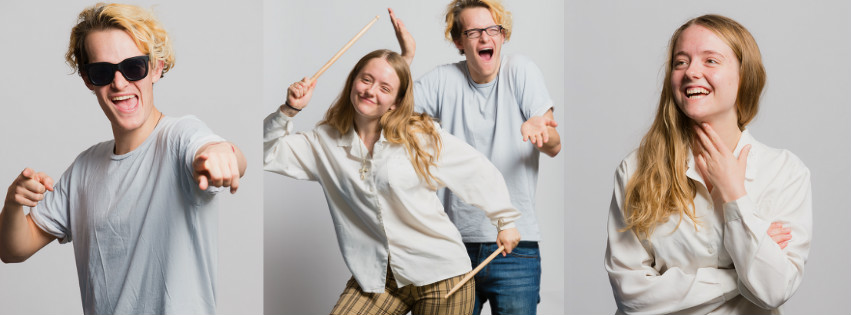Jessie Cooper
Beginning from the kindergarten years of our four main characters we are shown how their relationships with each other have evolved over time. At first Shelly, our lead and occasional narrator, describes the group as the four musketeers. Lauren is a vibrant personality and ‘is never wrong,’ Bindi is sheltered, sweet and from a Christian household, and Drew is the rough-housing male to complete the quartet. Amongst this we discover that Shelly’s personality is somewhat adaptable and she has a tendency to follow Lauren’s lead. This opening sequence was an excellent introduction to the show, as Sophie Coomber playing Shelly, gives an energetic and charismatic performance which sets the tone for the rest of the show. Her performance does not stand alone in its excellence, the casting for every role was well chosen with Nora Maareveland as Lauren, Chris Watts as Drew, and Bella Cook as Bindi, all offering depth and vitality in their portrayals.
The combination of Jane Yonge as director with Lucy Craig’s writing proved itself a harmonious pairing, with Yonge accentuating every beat of Craig’s script flawlessly; not a joke or tender moment missed or misguided. This was supported by musician Andy Gartrell who proved himself to be multi-talented; both accompanying scenes with beautiful guitar pieces, and stepping in as character Eric, the slightly creepy but super hard-core rock musician friend of Drew’s.
Every element of the show felt well put-together. The set design by Talei Timakata, most notably featuring the setup of two skate ramps on either side of the stage, made for great moments of physical comedy as well as dynamic scene sequences happening in and around them. Yonge made great use of these in her direction, using the heights and ramps to her advantage, which in turn helped to keep the energy of the show high right through to its conclusion.
The point of conflict in Bloody Hell Jesus (Get Your Own Friends) comes with Lauren’s announcement of conversion. Previously we have seen Lauren and Shelly joke about their devout friend Bindi and the silliness of her faith, which makes Shelly’s understanding of Lauren’s epiphany particularly difficult. The show addresses the issues and misunderstandings that can occur when confronted with religion. For example Shelly wonders if Lauren can keep watching scary films, or whether they can still be friends if they disagree in this way, and after a weed induced type vision ft. Hipster Jesus, Shelly worries for the first time whether Lauren could be wrong (a feat she previously thought impossible).
Although the independence and sense-of-self that Shelly experiences during this time is admirable,I found the moral of the piece skewed as she ultimately decided to part with Lauren at the summary of the show. This seemed as though Shelly was not able to bear Lauren as a friend now that she was a Christian, which does not do well as a positive message of acceptance. However, I believe this to be an unintentional emphasis, with the real message supposed to be focused on parting with the people holding you back from your own path.
Bloody Hell Jesus (Get Your Own Friends) was an excellent introduction to the Young and Hungry’s Festival of New Theatre, which take place between the 15-30 of July. Make sure you head down to BATS to support this talented company, the piece is every bit as funny and entertaining as the title would suggest.






